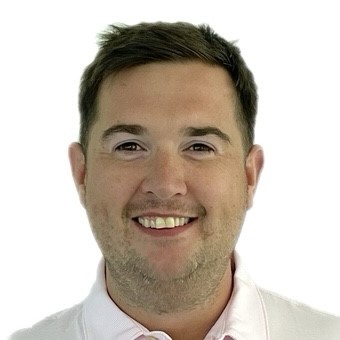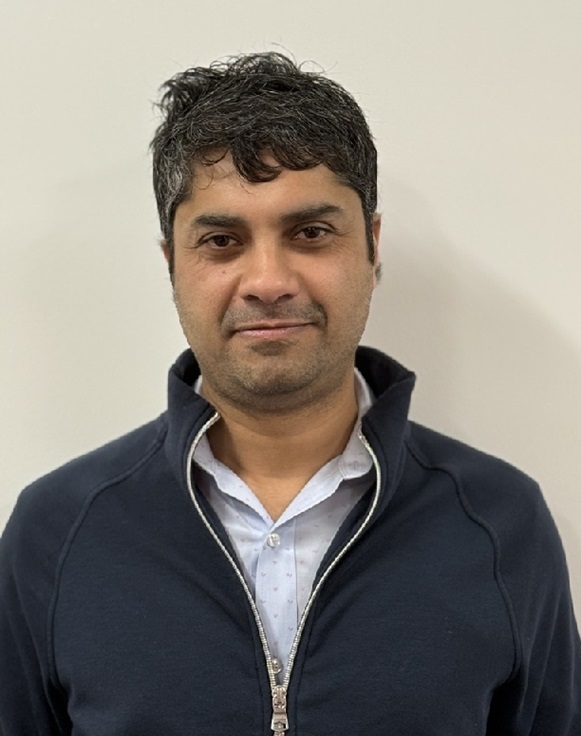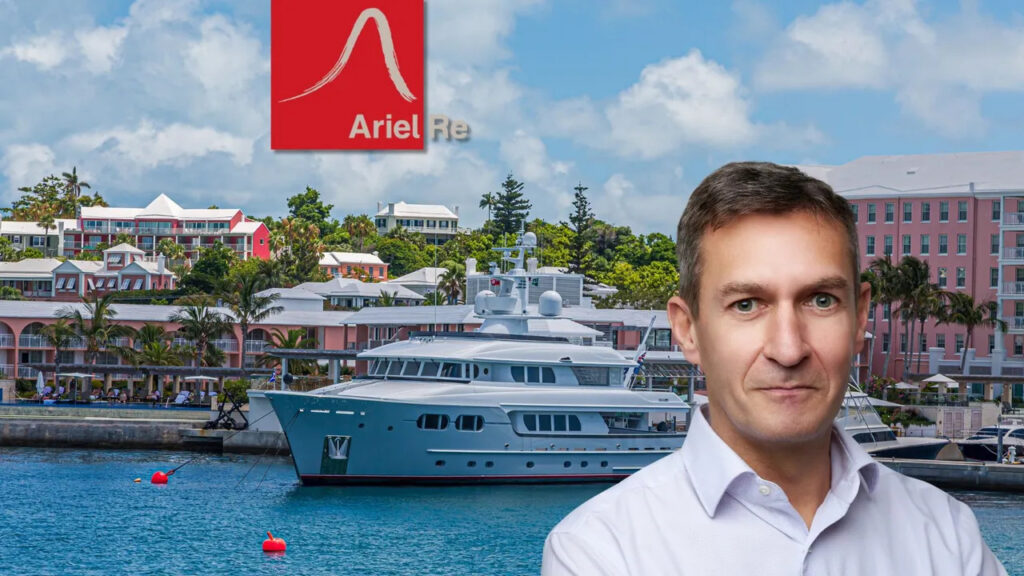
Ariel Re is writing more catastrophe reinsurance at a time when much of the sector has withdrawn. That’s one of the advantages of being a private company, but it is also backed by decades of experience, says CEO Ryan Mather.
Before embarking on his career in insurance, Ryan Mather was a science student, specifically in genetics
The dual realisation that he would have to spend years as a graduate student and a growing interest in the booming financial services industry sent him to the London insurance market and, he says, his science background gave him skills that have stood him in good stead.
Perhaps the main one was learning to stand by your beliefs—backed up by data. This is particularly relevant in an uncertain time for catastrophe reinsurance.
“Being in the lab, you can do an experiment, precisely the same thing, five times over, but only one of them will work, and you have no idea why,” Mather says. “You have to have the courage of your convictions when you’re doing it, because you have to know that it is going to work.”
Science also gave him an appreciation for data, which he thinks is a key differentiator for Ariel Re, which was bought by Pelican Partners and JC Flowers in 2020 after being owned by re/insurer Argo Group for about four years.
“We have a very strong system in the way we underwrite, but in terms of the analytics, we always want to do more, and we’re constantly striving for a little edge somewhere,” he says.
“But ultimately, when we underwrite, we’re using models. Humans are very bright, but our models can do 100,000 simulations in seconds, whereas none of our underwriters can. So you’ve got to make use of the technology.”
That technology—plus decades of experience at Ariel Re’s senior management and board level—has been vital as the company “ran to the risk” when many other reinsurers, stung by years of hefty losses, were de-risking and shifting away from catastrophe reinsurance to other less volatile lines.
Mather says he has no regrets. Even if the hurricane season could still prove to be expensive, he says the “step change” in premiums in 2023 should still earn the company an acceptable return.
“Our world has changed pretty materially in the space of about a year,” he tells Bermuda:Re+ILS. “We saw our part of the reinsurance market getting better from when we left Argo, at the end of 2020. 2021 was okay, the rates were fine; in 2022, they got a little bit better. And then in 2023, they took a step up in a big way—we saw some huge rate increases on that book.
“You have to think a long way out, but you also have to be reactive to what the weather brings today and tomorrow.”
Around the time of the January 2023 renewals, Ariel Re raised $270 million to take advantage of the hard market. That was not easy, Mather says, with much of the groundwork being laid before the turn of the year.
“It was a difficult one to get across to the new capital providers, because we said that we foresaw 50 point rate increases in peak zone catastrophe. And they would say: ‘how do you know?’.
“We said: ‘well, we’ve been doing it a long time. You’re just going have to trust us’. Of course, some did, some didn’t.
“It turned out that we saw just about 50 percent rate increases year on year on US cat, so we got it right. Thankfully, some people did believe us, but I hope more will next time.”
Mather is not critical of companies that were already opting out of the market, noting that one of the advantages of being privately owned is being able to handle more volatility without having to report results every three months.
“Public markets tend to punish volatility and the public companies out there recognise that,” he says, noting that he was well aware of it when Ariel Re was part of Argo.
“In terms of running towards the risk when other people are running away, that’s partly what we do,” he says. “We don’t mind taking a contrarian view of risk.
“But we’ve spent a lot of time, effort and money on our models, and we work hard to make sure they’re calibrated in a sensible way. Our models told us that with current rating the economics of writing cat were just fine, so we were encouraged by that.
“We were able, using the models, to convince the investors that the probable returns were likely to be pretty good, even with some volatility around them. It’s about having faith in a system, even in times of pressure, which of course we do.”

Ownership changes
That system has survived a number of changes for Ariel Re. Since joining the company in 2005 and becoming chief executive officer in 2016, Mather, along with several colleagues, has weathered a dizzying number of ownership changes.
Founded by industry legend Don Kramer in 2005, it was then bought by Wall Street investment giant Goldman Sachs, only to be spun out a year later. After more owners, it was purchased by Argo in 2017. Argo, which is itself now being sold, sold it to JC Flowers and Pelican Ventures in 2020.
It now seems stable, reinforced by the fact that it received backing from a subsidiary of Warren Buffett’s Berkshire Hathaway in 2021 and more recently, many new institutional investors. The company has a lofty vision to be “The Premier Manager of Reinsurance Risk” and become the preferred destination for cedants, capital and talent in the reinsurance industry worldwide.
Mather is fulsome in praising his colleagues and the boards of both Ariel Re and its London managing agency. The chairman is Jim Stanard, who founded RenaissanceRe and TigerRisk, and is considered to be a pioneer of the modern catastrophe reinsurance sector.
Other board members include Hamilton Insurance and Ironshore founder Robert Deutsch; former AIG chief financial officer Steve Bensinger; and longtime Stanard colleague Jayant Khadilkar, who Mather describes as a “cat modelling legend”. Mark de Saram, who headed Everest Re’s Bermuda reinsurance operations for a decade, is chairman of the managing agency.
That experience makes it easier to go against what seems to be the conventional wisdom, Mather says.
“Think about the stock exchange,” he says. “When the markets were crashing in 2007, how many buyers were there? Not many—everyone was a seller, and this is a similar situation.”
Still, “the theory is easier than the practice”, he admits. “And maybe once or twice, we have had to swallow quite hard when we’ve been pushing ourselves forward. But we have to trust the models and the system, and we’ve been doing this at Ariel Re for 17 years.
“I’ve been writing cat for 25-plus years, Jim has been writing it for 50 years, so we know what the inherent risks are. But we also know that writing the same or even better risk is very likely to lead to good outcomes, because the terms and conditions have changed, and prices are up very materially.”
Mather is reluctant to predict how long the hard market in property-cat may last but does not see many reasons for it to change.
“Predicting the future is fraught with danger,” he notes. “The reinsurance underwriting world has not had good returns for a number of years. People have to build their balance sheets and their credibility with their investors, and for that reason, I don’t see rates collapsing any time soon.
“I don’t think we’re going to see a super-competitive market, such as in 2017, 2018 and 2019.”

London presence
In the meantime, Ariel Re has transitioned from being part of a larger entity, Argo, to a standalone company. It has formed its own London managing agency, which manages Ariel Syndicate 1910 together with SPA 6117 and SPA 6136.
Ariel Re has had a long relationship with Lloyd’s and runs its underwriting through the market, which Mather says gives it “the best of both worlds” since much of the business is originated in the “cat hub of the world”—Bermuda.
But it never had its own managing agency, having used Argo’s when it was part of that company, and other “turnkey” agencies before that. Why change that now?
“When we bought Ariel Re out of Argo, we discussed this with Lloyd’s CEO John Neal and we agreed that with our level of ambition, we should match words with deeds and build our own managing agency, so that’s what we did.
“This allows us to be close to the regulator, and in control of our own destiny. The managing agency is the liaison between the insurance industry and the regulator, mostly, but also the capital providers. It allows us to fight our own battles, which we’re happy to do.”
Outside of catastrophe reinsurance, Ariel Re runs four other lines of business. Only one is primary insurance in a specialist area—insuring green energy projects. It is growing fast and enables Ariel Re to do something directly about a global threat to its long-term survival: climate change.
“It’s our only insurance line and it’s quite an esoteric business,” says Mather. “We don’t really compete with anybody. It’s not syndicated nor intermediated, so it’s a bit different.
“Over the course of our six years doing it we’ve discovered that the scale of projects has grown and grown. When we started the business, we had a $25 million line. Now $150 million isn’t enough, because the size of the projects is so big, and we’re constantly looking for ways to grow that.
“We have a consortium in Lloyd’s now, which helps. We provide the expertise and a decent amount of capacity and then our partners provide the rest of the capacity. Having an understanding of climate change and what’s going on politically behind it is very important because we are obviously trying to have a deep understanding of the topic on the cat side, but equally wanting to take advantage of the opportunities that come our way on the project side.”
Reinsurance academy
Mather is passionate about developing talent within the company, which employs an impressive number of young Bermudians. Recently, Ariel Re announced a raft of promotions and said that it wanted to be “a talent academy”.
Ariel Re is a relatively small company of 100 employees, but Mather clearly takes his colleagues’ wellbeing and development seriously.
“I take a great deal of joy from seeing their success, seeing people grow,” he says. “I’ve worked with some of the same people at Ariel Re for 17-and-a-half years and watched them go from young graduates into senior underwriters. And of course those people have allowed me to grow as well.”





